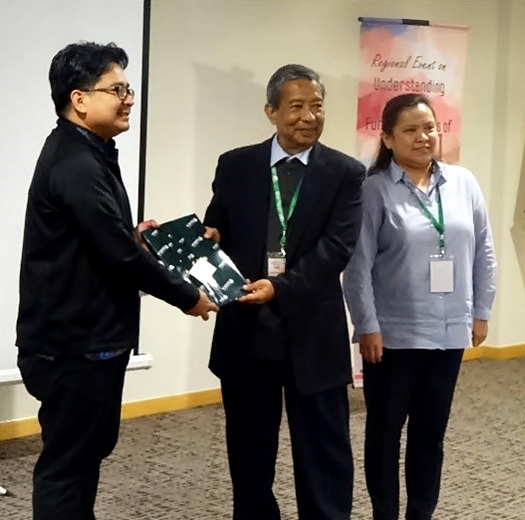 Participants are briefed on the different equipment being used for analysis of halal products at UPM's Halal Products Research Institute.
Participants are briefed on the different equipment being used for analysis of halal products at UPM's Halal Products Research Institute.
PUTRAJAYA, Malaysia – Fifteen Halal researchers, academicians, and officers from government regulatory bodies across six Southeast Asian countries participated in the four-day regional event here dubbed Understanding the Fundamentals of Halal towards Food Security in the ASEAN Region.
The workshop was held at the Everly Putrajaya Hotel on 8-11 April 2019. It was a collaboration between the Southeast Asian Regional Center for Graduate Study and Research in Agriculture (SEARCA) and the Universiti Putra Malaysia (UPM), together with the Southeast Asian University Consortium for Graduate Education in Agriculture and Natural Resources (UC) and the Food Security Center (FSC) of the University of Hohenheim (UHOH). It aimed to provide an opportunity for participants to enhance their understanding of the fundamentals of Halal, including its market, science, and technology, as well as the principles of Haram.
During the workshop's opening program on 8 April, Dr. Russly A. Rahman, Chairman of the UPM Secretariat Team, thanked all the organizations involved – SEARCA, UPM, UC, and FSC – for the tremendous support given to conduct the event. He also thanked the resource persons of the workshop for their willingness to share their experience and expertise with all the participants. He said that the workshop was designed to provide a platform for the participants to have an intellectual discussion about halal issues and the challenges that confront the halal industry.
 Dr. Maria Cristeta N. Cuaresma, Program Head, SEARCA Graduate Education and Institutional Development Department, delivers the welcome remarks on behalf of Dr. Fernando C. Sanchez, Jr., Chair of SEARCA's Governing Board.
Dr. Maria Cristeta N. Cuaresma, Program Head, SEARCA Graduate Education and Institutional Development Department, delivers the welcome remarks on behalf of Dr. Fernando C. Sanchez, Jr., Chair of SEARCA's Governing Board.
Representing Dr. Fernando C. Sanchez, Jr., Chair of SEARCA's Governing Board, Dr. Maria Cristeta N. Cuaresma, Program Head of SEARCA's Graduate Education and Institutional Development Department (GEIDD), said that the event serves as a venue for a more comprehensive understanding of halal and how it could contribute to food and nutrition security and to the overall competitiveness of the region's agriculture and food sector. She expressed the hope that the regional event would be a strategic starting point for the development of a globally recognized standard for halal in the ASEAN region.
In his officiating speech, Dr. Zulkifli Idrus, Deputy Vice Chancellor for Research and Innovation of UPM, conveyed his appreciation to SEARCA, UC, and FSC for the financial support for the workshop. He stated that UPM was the first university in Malaysia to establish a halal center, called the Halal Products Research Institute. He noted that the global demand for halal products and business is growing, with the increasing Muslim population and their rising income levels coupled with growing levels of awareness on halal were among the contributors of these growth. He then invited SEARCA to explore other possibilities of collaboration with UPM.
During the workshop proper, participants from Cambodia, Indonesia, the Philippines, Thailand, and Vietnam presented country situationers of the halal industry. Major topics tackled included Basics of Halal, Principles of Halal and Haram, Halal Science, and Halal Technology. Current issues and challenges in the halal food industry, including a discussion on existing regulations and laws on halal and the possibility of harmonizing current halal standards within the region, were also tackled.
 Ir. Dzulkifly Mat Hashim of UPM (center) receives a token of appreciation from Dr. Pedcris Orencio, Program Head of SEARCA's Research and Development Department, and Dr. Cuaresma.The participants came from Cambodia (1), Indonesia (4), Malaysia (3), the Philippines (5), Thailand (1), and Vietnam (1). They produced two major outputs, namely: 1) a re-entry action plan (on a per country basis) that outlined the gaps/challenges in the halal industry as well as their suggested strategies and actions to respond to these gaps and challenges, and 2) a collaborative regional action plan on building awareness on halal for both consumers and producers, and existing laws and policies on halal and what can be done to further improve such to guide the halal industry.
Ir. Dzulkifly Mat Hashim of UPM (center) receives a token of appreciation from Dr. Pedcris Orencio, Program Head of SEARCA's Research and Development Department, and Dr. Cuaresma.The participants came from Cambodia (1), Indonesia (4), Malaysia (3), the Philippines (5), Thailand (1), and Vietnam (1). They produced two major outputs, namely: 1) a re-entry action plan (on a per country basis) that outlined the gaps/challenges in the halal industry as well as their suggested strategies and actions to respond to these gaps and challenges, and 2) a collaborative regional action plan on building awareness on halal for both consumers and producers, and existing laws and policies on halal and what can be done to further improve such to guide the halal industry.
The workshop builds on the gains of a Project titled Safeguarding and Sustaining the Integrity of Halal Food implemented by UPM and Tokyo NODAI under SEARCA's Umbrella Program on Food and Nutrition Security for Southeast Asia. This umbrella program serves as a platform for collaborative research, capacity building, and knowledge management in response to the challenges of food and nutrition security in the individual countries of Southeast Asia and the region as a whole. Under this umbrella program, SEARCA supported the implementation of six regional studies each developed and carried out by UC members. Besides the study on halal food, other projects include a research on food reserves, postharvest systems improvement, indigenous crops, human resource development in agriculture, and the implications of the ASEAN Economic Community to regional food security. (Nova A. Ramos)